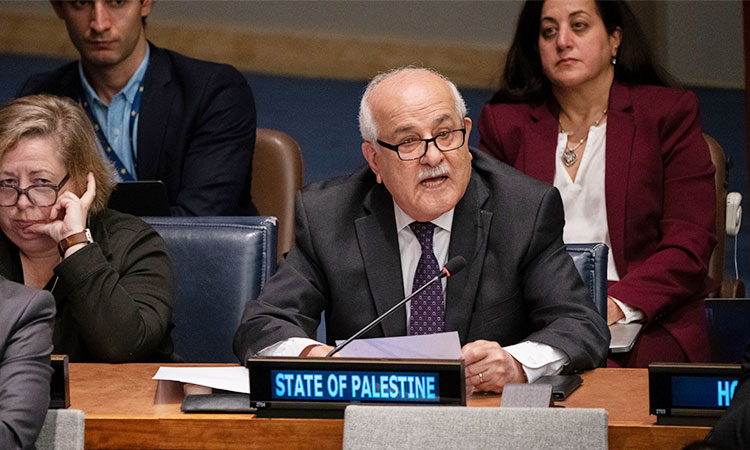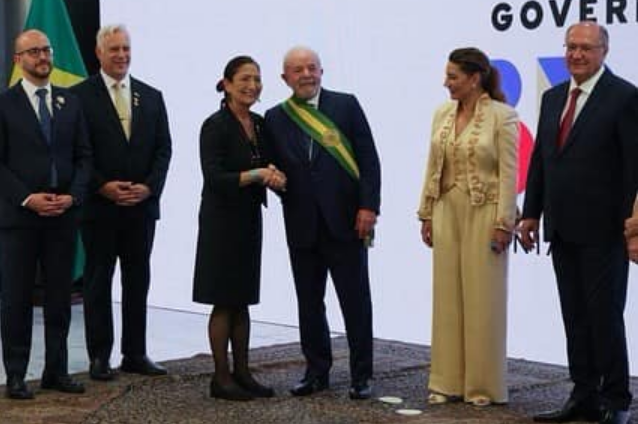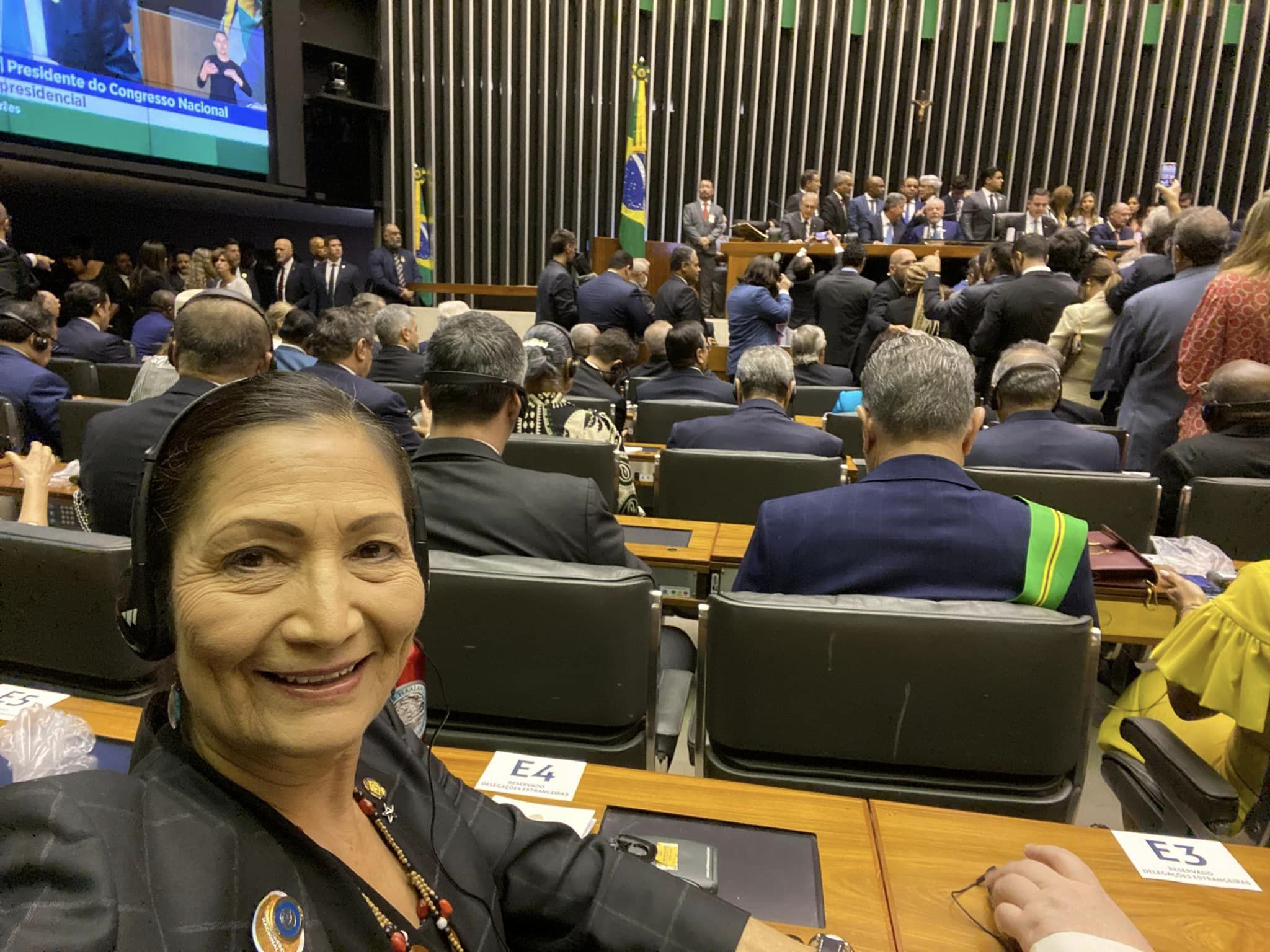Brasilia, Jan 1 (EFE).- Luiz Inácio Lula da Silva began his third term as president of Brazil on Sunday with a huge ceremony full of symbolism, in which he reinforced his commitment to combating the enormous social inequalities that divide the country.
The 77-year-old leftist leader, who governed between 2003 and 2010, returned to the presidency after narrowly defeating the far-right Jair Bolsonaro, who has not acknowledged his defeat and two days ago flew to the United States to avoid having to pass Lula the presidential sash, as is tradition and protocol.
The inauguration had strong international support with delegations from 68 countries, including 20 heads of state or government, as well as significant popular support with nearly 300,000 people packing the center of the capital for one of the largest ceremonies in the history of Brazil.
Lula gave two speeches and focused both on his firm commitment to combat a range of inequalities that divide the population and “hold back” the country’s development, especially the huge gap between rich and poor, but also racial and gender inequality.
The president burst into tears when talking about families forced to rummage through the garbage to find food and, from the pulpit of the Planalto presidential palace, asked the crowd gathered in the Plaza de los Tres Poderes: “Help me!”
Lula took advantage of Bolsonaro’s absence to add symbolism to the formality of receiving the presidential sash, which illustrates the transfer of power. In the absence of his predecessor, he instead received it from a group of citizens exemplifying the diversity of Brazilian society.
With them, and his dog Resistencia, Lula climbed the ramp that leads from the street to the first floor of the Planalto Palace, a gesture also highly symbolic since presidents usually enter the palace alone, walking among two rows of soldiers from the regiment of the Independence Dragoons.
A large part of Lula’s speeches were based on criticism of Bolsonaro, without naming him, whom he accused of having led a “government of national destruction.”
In particular, he promised that those responsible for the seriousness of the pandemic in Brazil, where almost 695,000 people died from Covid-19, will not go unpunished, while the country was led by a “denialist government.”
He also described the damage inflicted by the Bolsonaro government on the economy, the environment, health and education sectors and, above all, the social fabric of Brazil, which emerged from the Oct. 30 elections divided like never before.
In fact, he chose the phrase “union and reconstruction” as the motto of his new government and a few hours after being sworn in, he took the first step to revoke Bolsonaro’s most controversial measures, signing his first 13 decrees.
Among others, he ordered the creation of a new registry of all weapons purchased by civilians in the last four years, taking advantage of the release of weapons promoted by Bolsonaro.
He also revoked a decree that allowed mineral exploitation on indigenous lands and reactivated the so-called Amazon Fund, set up with donations from Germany and Norway to contribute to the protection of the rainforest and which had been suspended by Bolsonaro in 2019.
Another of the promises that Lula made was to break the “diplomatic isolation” of the last four years under a president who only maintained fluid relations with countries governed by the extreme right.
It is a task that begins on the right foot given the large representation of authorities from 68 countries who attended the inauguration, including the king of Spain and leaders of Portugal, Germany, Argentina, Colombia, Uruguay, Ecuador, Bolivia, Chile, Paraguay and Honduras.
The president of the National Assembly of Venezuela, Jorge Rodríguez, also attended, with whose country Lula announced that he would restore diplomatic relations as of Jan. 1, after Bolsonaro ended them four years ago.
In addition, former heads of state with whom Lula has friendships with attended, such as Uruguay’s José Mujica and Bolivia’s Evo Morales, who gave Lula a jacket similar to another that he gave him years ago and that the Brazilian leader wears frequently.
In his inauguration speech, Lula announced that Brazil is going to “retake integration” in Latin America to have “an active and proud dialogue” with the other regions of the world.
“We will resume integration from Mercosur, with the revitalization of the Union of South American Nations (Unasur) and other sovereign bodies” in Latin America, he declared before parliament
Brazil's Lula decrees extension for tax
exemption on fuels

General view as Brazil's new President Luiz Inacio Lula da Silva delivers a speech after being sworn in at the National Congress, in Brasilia, Brazil, January 1, 2023.
REUTERS/Jacqueline Lisboa
January 2, 2023 -
BRASILIA (Reuters) - Brazil's newly sworn-in President Luiz Inacio Lula da Silva signed a decree on Sunday extending for 60 days an exemption for fuels from federal taxes, a measure passed by his predecessor aimed at lowering their cost.
The decree was among the first batch of decisions taken by Lula hours after his inauguration as president, succeeding far-right President Jair Bolsonaro, and officially establishing his cabinet of 37 ministers.
The exemption from federal taxes on fuel represents a revenue waiver of 52.9 billion reais per year, and Economy Minister Fernando Haddad had said that it would not be extended, creating a division in the new cabinet.
Earlier on Sunday, Senator Jean Paul Prates, who is expected to be named chief executive of state-run oil company Petrobras, told reporters that extension of the exemption would go ahead and last 60 days.
Prates said the exemption could be resumed by the new government in a "much more comfortable" way.
He has said that one option under study was an extension for six months or until the end of the year for tax exemptions on diesel and liquefied petroleum gas.
The extension for gasoline was opposed by sectors of the economy, such as the ethanol industry, which loses ground in its tax advantage over gasoline.
(Reporting by Anthony Boadle; Editing by Nick Zieminski)
Brazil's Lula promises 'hope and
reconstruction' in inaugural speech
DPA
January 01, 2023

Brazilian President-elect Luiz Inacio Lula da Silva is welcomed to the National Congress by the numerous heads of state and government officials during his inauguration ceremony. Jens Büttner/dpa
Brazilian President-elect Luiz Inacio Lula da Silva is welcomed to the National Congress by the numerous heads of state and government officials during his inauguration ceremony. Jens Büttner/dpa
Veteran leftist Luiz Inácio Lula da Silva took the oath of office on Sunday as Brazil's first democratically elected president to win three terms, with more than a dozen heads of states in attendance.
"My message today is one of hope and reconstruction," Lula said in his inaugural speech. "Democracy was the big winner of this election."
In a break from custom, his predecessor, the far-right nationalist Jair Bolsonaro, did not hand over the presidential sash to Lula, after the Bolsonaro travelled to the US state of Florida with his family on Friday.
Before the ceremony, Lula drove through the capital Brasília in an open Rolls Royce with his wife Janja and new Vice President Geraldo Alckmin and his wife. A large music festival with over 40 artists was set to follow the swearing-in.
Lula led Brazil from 2003 to 2010, at a time when his government profited from the raw materials boom and was able to lift millions of people out of poverty through major social programmes.
However, there was also widespread corruption and Lula was also sentenced to a lengthy prison term for corruption and money laundering, though the sentence was later overturned.
He beat Bolsonaro in a run-off election in October.
During Bolsonaro's term in office, relations with other countries were tense, as deforestation of the rainforest increased unchecked and the government was accused of contempt for human rights.
World powers view Brazil under Lula as a potential strategic political and economic partner. Brazil's enormous natural resources and large agricultural economy make it a big power in Latin America.
Lula has announced plans to strengthen environmental and climate protection, plus measures to combat a resurgence of hunger amid the country's economic slowdown and high inflation.
But the 77-year-old faces major challenges to achieving his inclusive agenda, first and foremost of which is Brazil's highly polarized politics. Bolsonaro's allies control both chamber of Congress.

Brazilian President-elect Luiz Inacio Lula da Silva is welcomed to the National Congress by the numerous heads of state and government officials during his inauguration ceremony. Jens Büttner/dpa

Brazilian President-elect Luiz Inacio Lula da Silva (R) welcomes German President Frank-Walter Steinmeier to the National Congress among numerous heads of state and other guests of honor during his inauguration ceremony. Jens Büttner/dpa 









:quality(70)/cloudfront-eu-central-1.images.arcpublishing.com/irishtimes/KX7LO6ZUQJORBM7OC6RVL7FRPQ.jpg)

:quality(70)/cloudfront-eu-central-1.images.arcpublishing.com/thenational/A5VKAKRALFZIHB5L6VGY2KY67U.jpg)
:quality(70)/cloudfront-eu-central-1.images.arcpublishing.com/thenational/KIARWZED5U34BSZSPKRUTAL6VU.jpg)
:quality(70)/cloudfront-eu-central-1.images.arcpublishing.com/thenational/DFEJMXQSZCIRP4RBWRHGZL25SM.jpg)
:quality(70)/cloudfront-eu-central-1.images.arcpublishing.com/thenational/OAGKLI3SFBNNTP6H6BCZ5YSHZE.jpg)
:quality(70)/cloudfront-eu-central-1.images.arcpublishing.com/thenational/QY3FVKLK3QYZJE3GJYCVRBK3IM.jpg)
:quality(70)/cloudfront-eu-central-1.images.arcpublishing.com/thenational/VTV57L3KV5VDSVQQ6GDICZSQNY.jpg)
:quality(70)/cloudfront-eu-central-1.images.arcpublishing.com/thenational/H22HRWYY7KL2G7YTWUSZQQ4Y5U.jpg)
:quality(70)/cloudfront-eu-central-1.images.arcpublishing.com/thenational/562RCYYVECN73BU6A5LGZIXUIE.jpg)
:quality(70)/cloudfront-eu-central-1.images.arcpublishing.com/thenational/CCJD4WWWVFSXG53FDEMD2ACQPQ.jpg)
:quality(70)/cloudfront-eu-central-1.images.arcpublishing.com/thenational/PGWOGLZ72YPIEXHYUXT4M2O2L4.jpg)
:quality(70)/cloudfront-eu-central-1.images.arcpublishing.com/thenational/OHHIXNMEJNKDP5BT4ZSOEVUMRE.jpg)
:quality(70)/cloudfront-eu-central-1.images.arcpublishing.com/thenational/X7RMLNFFM4VTAFYM3QJKBOSV5E.jpg)
:quality(70)/cloudfront-eu-central-1.images.arcpublishing.com/thenational/LOMU7FVLWDZ5P3ANJJMZQZT44E.jpg)
:quality(70)/cloudfront-eu-central-1.images.arcpublishing.com/thenational/O4XDIRMNKPTE64CY3F2IHXM5AE.jpg)
:quality(70)/cloudfront-eu-central-1.images.arcpublishing.com/thenational/2SIPXSPOPH5TGIL7LHJRXSPAYE.jpg)
:quality(70)/cloudfront-eu-central-1.images.arcpublishing.com/thenational/WC74QHZX3ONXFV5NZKW2KPO74U.jpg)
:quality(70)/cloudfront-eu-central-1.images.arcpublishing.com/thenational/4KK3HBEG5WCCXDCQY6QOUFAI4Y.jpg)
:quality(70)/cloudfront-eu-central-1.images.arcpublishing.com/thenational/4RPGW364DNHI7PKSQVIUBS4F5M.jpg)
:quality(70)/cloudfront-eu-central-1.images.arcpublishing.com/thenational/HB5BQ7YQSB7XWUC536TB6QWKOI.jpg)
:quality(70)/cloudfront-eu-central-1.images.arcpublishing.com/thenational/6NOELZ6EH6FIKPCVWA3R7T3YQI.jpg)
:quality(70)/cloudfront-eu-central-1.images.arcpublishing.com/thenational/X7XMOKO6PCCUS326SST6Y2C6DA.jpg)
:quality(70)/cloudfront-eu-central-1.images.arcpublishing.com/thenational/U2ISUQQ6UFASFMWPDZIIRPYORY.jpeg)
:quality(70)/cloudfront-eu-central-1.images.arcpublishing.com/thenational/U367AUSNX6KTYFK3JLXC3KT7KE.jpg)
:quality(70)/cloudfront-eu-central-1.images.arcpublishing.com/thenational/EJHCPCF5B36PCDZQREFQYB36HI.jpg)
:quality(70)/cloudfront-eu-central-1.images.arcpublishing.com/thenational/R67OKFQDGGATQJQICGJLWQXNUU.jpg)
:quality(70)/cloudfront-eu-central-1.images.arcpublishing.com/thenational/IGJ5MAKSMCAT5R6KW5RHKVJSYQ.jpg)
:quality(70)/cloudfront-eu-central-1.images.arcpublishing.com/thenational/LQNJCHDI36IXNMNZJON52CCL6M.jpg)
:quality(70)/cloudfront-eu-central-1.images.arcpublishing.com/thenational/M5Q73FSHK5LJDXHM6EJBCZQ524.jpg)
:quality(70)/cloudfront-eu-central-1.images.arcpublishing.com/thenational/4Y6ITYPBPJD4DGPKCMLSKOEG3U.jpeg)
:quality(70)/cloudfront-eu-central-1.images.arcpublishing.com/thenational/WOGO3E27AEMIEBPRVWCOBZCJTQ.jpg)
:quality(70)/cloudfront-eu-central-1.images.arcpublishing.com/thenational/CDPOFPDMHVZFXJL4L4TVWHEB3I.jpg)
:quality(70)/cloudfront-eu-central-1.images.arcpublishing.com/thenational/SEPUZLN6OJOPYNNQWIL2TKBC4U.jpg)






